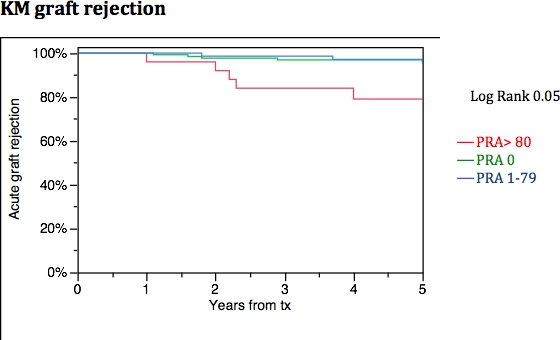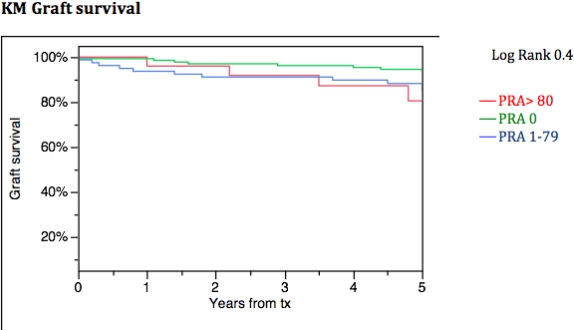Do Highly Sensitized Recipients Benefit from the Immunological Advantages of Zero Mismatched (0MM) Deceased Donors (DD) Kidney Allografts?
1Internal Medicine, Case Western Reserve University, Cleveland, OH
2Glickman urological and kidney institute, Cleveland Clinic, Cleveland, OH.
Meeting: 2016 American Transplant Congress
Abstract number: A241
Keywords: Allocation, HLA matching, Kidney transplantation, Panel reactive antibodies
Session Information
Session Name: Poster Session A: Long Term Outcomes in Kidney Transplantation
Session Type: Poster Session
Date: Saturday, June 11, 2016
Session Time: 5:30pm-7:30pm
 Presentation Time: 5:30pm-7:30pm
Presentation Time: 5:30pm-7:30pm
Location: Halls C&D
HLA 0MM DD transplants have superior outcomes compared with outcomes for grafts with ≥1 HLA mismatches, but when past reports analyzed 0MM outcomes in DD, they pooled together recipients with low and high panel reactive antibodies (PRA). Recent studies have questioned the benefit of 0MM transplants in highly sensitized recipients due to their immunological disadvantages. Aim of study: Investigate the outcome of 0MM transplants in the highly sensitized recipients. Methods: Data were retrospectively analyzed from 253 recipients who received HLA-A, -B, -DR 0MM deceased-donor (DD) kidney only transplant in our Institute (1990 – 2012). The study population were classified into 3 groups according to the pre transplant cPRA; I) cPRA 0 (57%), II) 1-79 (32%), and III) ≥ 80(11%). The clinical end points compared were the incidence of biopsy proven acute graft rejection (BPAR), graft loss, and patient death. KM graphs and Cox models were used for statistical analysis. Results: The 3 groups were comparable in terms of age, gender, and race. Mean follow up was 7.1 (±4.4)years. History of previous kidney transplantwas noticed in 18.8, 25.9, and 35.6% resp (p=0.4). 5 years BPAR rate was 12.5, 12.5, and 17.8% resp (Log rank 0.05). 5 years graft survival was 75.6, 70.3, and 85.7% resp- (Log Rank 0.4), and patient survival was 62, 70, and 75% resp (Log Rank 0.7). 5 years SCr was 2, 2.5, 2.1 resp (p = 0.9). Conclusion: Highly sensitized recipients showed a trend toward higher incidence of BPAR, however, patient and graft survival as well graft function were not worse compared to non and low sensitized recipients. Highly sensitized recipients do benefit from the 0MM DD grafts, however prospective national data studies are warranted. ,
,
CITATION INFORMATION: Elfadawy N, Flechner S, Schold J. Do Highly Sensitized Recipients Benefit from the Immunological Advantages of Zero Mismatched (0MM) Deceased Donors (DD) Kidney Allografts? Am J Transplant. 2016;16 (suppl 3).
To cite this abstract in AMA style:
Elfadawy N, Flechner S, Schold J. Do Highly Sensitized Recipients Benefit from the Immunological Advantages of Zero Mismatched (0MM) Deceased Donors (DD) Kidney Allografts? [abstract]. Am J Transplant. 2016; 16 (suppl 3). https://atcmeetingabstracts.com/abstract/do-highly-sensitized-recipients-benefit-from-the-immunological-advantages-of-zero-mismatched-0mm-deceased-donors-dd-kidney-allografts/. Accessed February 25, 2026.« Back to 2016 American Transplant Congress
